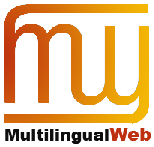Type of project: European | Start date: 01/04/2010 | End date: 31/03/2012
Given the importance of the World Wide Web to communication in all walks of life, and as the share of English Web pages decreases and that of the languages spoken in the European Union and around the world increases, the importance of ensuring the multilingual viability of the World Wide Web is paramount.
In order to build on the current internationalization of the Web and move it forward, it is important to raise awareness of the existing best practices and standards related to the management of content on the multilingual Web as well as to look forward to what remains to be done.
MultilingualWeb was coordinated by the World Wide Web Consortium (W3C), an organization currently formed of around 400 member organizations worldwide from research and industry, headed by the Web’s inventor, Sir Tim Berners-Lee.
Other twenty-two partners, representing stakeholders from a range of affected areas, helped to run the project.
The core of the project focused around 4 workshops, hold over a two-year period, where the public was invited to learn about and discuss standards and best practices and to get a clearer view of where we stood and what gaps needed to be addressed.
In parallel with (but not funded by) the project, W3C developed some practical tools including an internationalization checker for HTML, a proposed outline for training and results for tests related to internationalization.
The expected impacts of the project were:
- to contribute to a better awareness of standards and best practices in the area of the multilingual Web;
- to provide a catalyst for future projects in the areas of multilingual Web standardization, best practices and tool development;
- to develop relationships and awareness of shared issues across organizations, scientific disciplines and academic/industrial boundaries;
- to improve the use of multilingual standards and best practices in the creation of pages using (X)HTML and CSS by content developers;
- to improve the support for multilingual features in Web user agents.
Standards and best practices enable the interoperability of data, which in turn maximises the potential for accessing information, ensures the longevity and usability of data and improves the efficiency of processes for producing, localizing and disseminating information.
This project was particularly concerned with increasing interoperability and encouraging coherence across the multilingual Web.
Standards provide targets that push applications to consider the requirements for supporting the multilingual aspects of the Web for the creation, display and management of the content.
Important standardisation work has already been done or is in progress to establish a base for a multilingual deployment of the Web.
Organizations such as W3C and IETF, for example, have worked on the use of Unicode in Web technologies, the roll-out of Internationalized Domain Names, the development of standardised language tags, etc. .
Nevertheless, people producing multilingual content for the Web feel that there remain a number of barriers to a full multilingual roll-out of information and tools and that these barriers need to be identified.
These barriers, in a range of areas, reduce efficiency or prevent the work of those attempting to provide a truly multilingual Web experience, affecting the ability to produce, localize, manage and share information and applications on the Web.

Acronym:
MultilingualWeb
Funding programme:
Competitiveness and Innovation framework Programme - Information and Communication Technology Policy Support Programme
Funding body:
European Commission
Grant agreement:
CIP-ICT-PSP-2009-250500
Status:
Ended
CNR-ILC role:
Beneficiary
CNR-ILC Research Unit Chair:
Monica Monachini
Staff:
Paola Baroni
Roberto Bartolini
Website/s:
http://www.multilingualweb.eu

